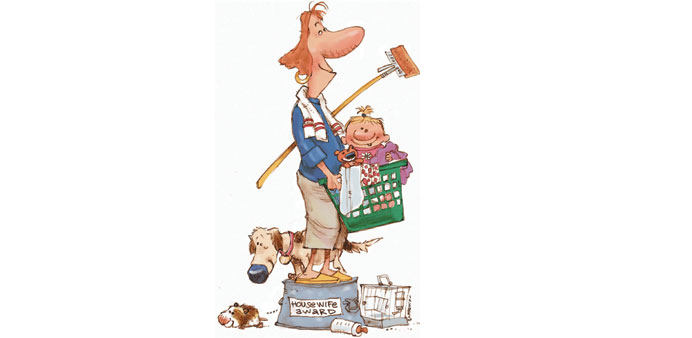By Oliver Burkeman/New York
New research recently revealed that men still don’t do anywhere near their share of the cleaning. (This was a US government survey. There might be a news story about it under all that crap on the coffee table, if you could be bothered to tidy it.)
Childcare and cooking are much more equal these days, but women are still far more likely to get landed with vacuuming crisps off the carpet. This led columnist Jon Chait to make a provocative suggestion: what if it’s because men just have lower standards of cleanliness? “My brother’s three-dude college apartment was so filthy, it was condemned by the (local) board of health,” he wrote.
“It had a spilled milkshake on the floor that stayed there all year, forming a permanent, unearthly silver blob that became an object of curiosity.”
Sure enough, one study found that single men, with no one else to do the cleaning, still do half as much as single women. This doesn’t prove sexism’s not involved – perhaps it’s social pressure that causes women to care more about cleanliness – but it does imply that people are differently bothered by hygiene. To feel motivated to clean something, you’ve first got to notice, and care, that it’s dirty.
I thought of Chait’s milkshake, as it were, when reading Hidden In Plain Sight: The Social Structure Of Irrelevance, a recent book by sociologist Eviatar Zerubavel. His overarching point is that everything we do depends, first, on what we define as worth noticing: you can’t care about mess, or anything else, if you don’t “see” it as an important part of reality to start with.
The famous “invisible gorilla” effect demonstrates this in visual perception: people asked to count passes between basketball players on video fail to notice a person in a gorilla suit walk across the screen. (Even most radiologists, it’s been shown, fail to see miniature gorillas added to CT scans.)
But Zerubavel argues this applies not just to vision, but to the whole way we approach the world, dividing it into “foreground” stuff that matters and “background” that doesn’t. Relevance isn’t objective. Hence the Soviet joke about the worker who every day pushes a wheelbarrow of rubbish through the factory gates, frustrating the guard, who’s sure he must be smuggling something out. Years later, after they’ve retired, the guard asks what he stole. “Wheelbarrows,” the worker replies.
Nor is this mere abstract philosophising. You can change the world by shifting what’s foregrounded: smoking, Zerubavel notes, used to be background; now, its foreground status helps keep it stigmatised.
And one reason so many celebrated buildings are nightmarish to live or work in is “architectural blindness”: architects, research has shown, are more prone than others to seeing buildings as discrete objects, neglecting how they integrate with their surroundings.
Hence the common advice for boosting creativity: defamiliarise yourself with the world. Notice the space between objects, the silence between sounds. “To see what is in front of one’s nose needs a constant struggle,” wrote George Orwell.
Be warned, though: get too good at this, and you could find yourself doing a lot more cleaning. -Guardian News and Media

